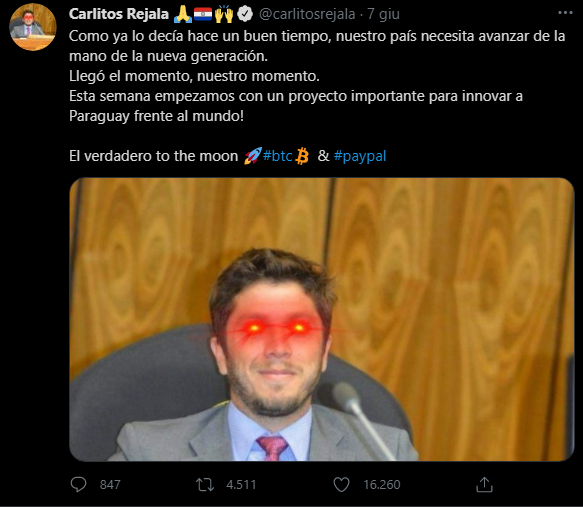El Salvador's decision to accept BTC as legal tender is affecting the rest of Latin America. "Stay tuned, because it will be a big surprise for Paraguay and the whole world," announces a Paraguayan politician

Paraguayan MP Carlitos Rejala and Senator Fernando Silva Facetti plan to present a bill on Bitcoin (BTC) to Congress on 14 July: the two politicians aim to highlight how urgent it is for lawmakers to formulate a coherent strategy for digital assets in the country.
Last week, Rejala wrote on Twitter:
"I'm here to unite Paraguay, that's why Senator Fernando Silva Facetti and I have decided to jointly present a bill on Wednesday 14 July!
Stay tuned, because it will be a big surprise for Paraguay and the whole world. Something HUGE is coming."
Although Rejala did not specify what this bill would entail, some lawmakers would like to follow El Salvador's example and make Bitcoin a legal tender.
On 6 June, Rejala wrote on Twitter that the digital assets would somehow be connected to "an important project to innovate Paraguay in front of the world:"
Based on Rejala's previous statements, the upcoming bill will introduce measures to make Paraguay a major hub for investors, companies and perhaps even cryptocurrency miners. Some speculate that the country will make BTC a legal tender.
Just like other South American lawmakers, Rejala has changed his Twitter profile picture to include laser eyes, a symbolic gesture to show the world his support for Bitcoin.
Latin America has emerged as a potential hotbed for cryptocurrency adoption due to strong economic and fiscal pressures in many areas of the continent, especially in nations such as Argentina, Venezuela and Mexico.
What does it mean?
Making a currency legal tender means making it mandatory to accept it as a means of payment. The law passed contains this requirement, while excluding those who do not have access to the technology needed to accept cryptocurrency. It also stipulates that all outstanding dollar debts can be paid in bitcoin and allows taxpayers to pay their taxes in bitcoin. It also stipulates that the price of any product or service can be expressed in bitcoin, which will make cryptocurrency an official unit of account in the country (although, given the current high volatility of the bitcoin price against the dollar, it is currently difficult for any merchant to price their products in cryptocurrency).
The reasons.
The reasons for the proposal becoming law are numerous, but Paraguay is in a very different situation from El Salvador, it is not a dollarized currency and, although very weak, can be managed by a functional central bank. The need to partially free oneself from the US dollar is, at least for the moment, non-existent in the country. The sensitivity of parliamentarians towards this type of technology also seems to be very low.
Some have put forward the hypothesis that Paraguay, which has a lot of hydroelectric power (which it exports to neighboring countries), could become an interesting hub for miners, who are trying to relocate away from China. Here again, however, we are in the realm of the maybe and wishful thinking, rather than in front of a serious and articulated project like that of El Salvador.
There is a well-founded suspicion that Paraguay is interested in attracting companies working with Bitcoin or otherwise on blockchain, offering a safe haven while the winds of regulation blow in the US and Europe, thus attracting foreign investment into the country, and seize this opportunity before other South American nations that have made proposals in this direction (El Salvador, Panama etc. ...)
We will see how this will turn out, but at the moment the promoters of the bill do not have sufficient support in the Chamber of Deputies.
How this can affect BTC price?
The price of BTC is strongly influenced by the trust placed in it as a medium of exchange and store of value, so adoption by national governments only increases this trust as well as the user base and thus volumes. On the other hand, BTC is a finite intangible asset, so with greater demand for it, the price should also rise. However, this is not happening in the immediate future for various reasons (market cycles, various events related to the measures taken by the Chinese government regarding miners, which at this time have a much greater impact, etc.), but it lays the foundations for upward movements in the medium to long term.
Written by Macron, Cryptosniperz Team
Posted Using LeoFinance Beta
